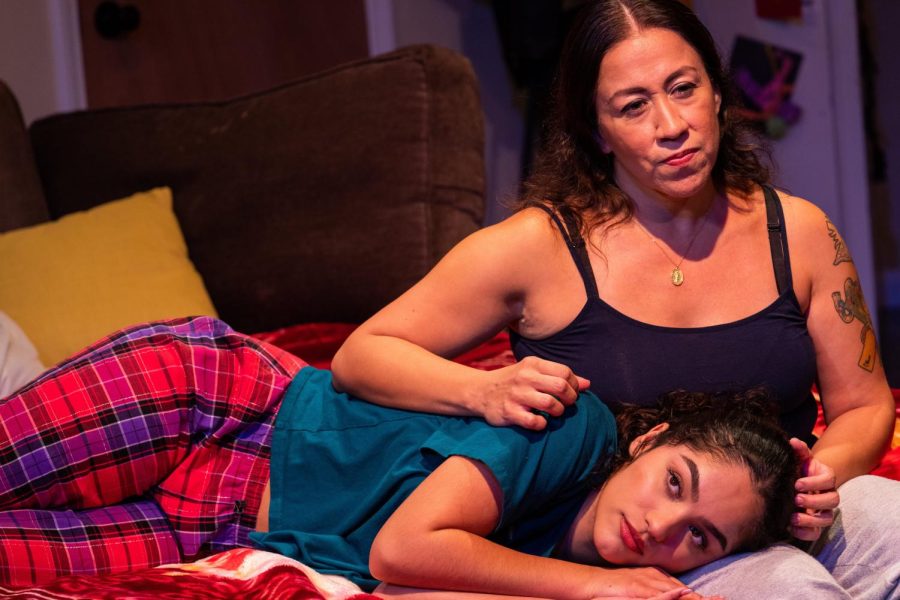‘With specificity, there’s universality:’ Destinos uplifts and amplifies Latino voices
Photo courtesy of Jay Kelly and Cathy Taylor
“Alma,” a new play about a single, immigrant mother premiered on Sept. 22 as a part of the Destinos festival.
October 6, 2022
When Ana Velazquez was growing up during the 1980s in McKinley Park, her family was one of only a few Mexican American families in the Chicago working class neighborhood. As her interest in theatre grew throughout high school and college, she sought to embrace her identity as a Latina from Chicago.
But Velazquez said there weren’t many opportunities to tell stories she could relate to early in her directing career.
On Sept. 22, “Alma,” a play about a single, immigrant mother that Velazquez directed, premiered at the American Blues Theater as a part of Destinos, Chicago’s annual Latino theatre festival.
“It’s almost overwhelming when you discover how many stories are out there,” Velazquez said about meeting other Latine artists. “There are so many people just itching to have a platform to tell their stories.”
Destinos’ mission is to uplift and amplify the voices of Chicago-based Latino theatremakers, according to Sara Carranza, communication director for the Chicago Latino Theater Alliance.
Latines are one of the city’s largest growing demographics, and Destinos seeks to ensure the performing arts scene reflects the stories of Chicago area residents.
“We aren’t just a border story, we aren’t just an urban story and we aren’t just a sob story, which is often what we are portrayed as,” Carranza said. “Having Latinos write their stories and having Latinos on stage is how to adequately tell Latino stories.”
Showcasing 13 productions over the course of five weeks, Destinos is organized by CLATA members, who provide sustainable support for Latine artists in addition to running the annual festival.
CLATA has contracted more than 50 Latine artists and 100 technicians for Destinos this year. Outside the festival season, the organization introduces partnering artists to funders, invites them to grant application meetings and provides occupational development training.
“We’re creating an ecology between big theaters and small theaters to really uplift Latino voices and artists, when for a long time they’ve been relegated to the sidelines,” Carranza said.
Carranza said the nonprofit also builds a sense of ongoing community for theatremakers. Staff members at CLATA often check in with partnering artists to see how they are doing personally.
During the pandemic, CLATA introduced Velazquez to Arts Midwest, an artist residency program in Indiana. At the end of the residency, Destinos staff members drove to Indiana to view Velazquez’s final project.
“It’s not every day that you have people who support you every day both as an artist but also as a person,” Velazquez said.
Carranza said part of Destinos’ mission is to foster cultural exchange between different areas of Chicago through performance and storytelling.
Although the majority of the festival’s audience is Latine, Carranza said she is proud of the event’s accessibility and open-door policies. All Spanish-language performances at Destinos have English subtitles to invite non-Spanish speaking audience members.
Destinos also seeks to combat stereotypes that group the Latino community into a monolith, according to Carranza. She said she is excited to showcase holistic, new work that presents individual Latino experiences.
“We are not just about catering to our community,” Carranza said. “(Destinos) is also about showing to the city who we are. Stories can have big, overarching, identifiable themes. With specificity, there’s universality.”
Velazquez said she is excited that “Alma” bridges a connection between the American Blues Theater and CLATA.
Her vision when directing “Alma” revolved around her personal experience, she added. As the daughter of one parent born in Mexico and another born and raised in Chicago, Velazquez said she connected to the main characters and wanted to portray them as honestly as possible.
“We all have our own journeys, and even if you aren’t uncodumented, it’s important to know what risks they take, what are the circumstances and what they leave behind,” Velazquez said.
Xavier Custodio is the director of “Sancocho,” a play about two sisters who share family secrets while cooking. The play will open at Windy City Playhouse on Oct. 8.
Custodio is also the artistic director of Visión Latino Theater Company in Chicago, an innovative theatre company that aims to portray perseverance through its characters and stories. He said he is excited to be a part of an ongoing support system for Latino theatremakers.
“We don’t have a million dollars, and we have to rely on each other to make (theatre) happen,” Custodio said. “We’re the youngest theatre company in the group working with everyone… and (Destinos) has given us a voice in the theater landscape.”
This year’s festival will also honor the memory of Myrna Salazar, Destinos’ late executive director and co-founder, who died in August.
Salazar was “larger than life” and a maternal figure for Chicago Latine artists at CLATA, Carranza said.
“(Salazar) laid an amazing groundwork, and the only reason we didn’t postpone the festival is because she wouldn’t have allowed it,” Carranza said. “She truly cared about not just our work but the people.”
Email: [email protected]
Twitter: @ash_goren
Related Stories:
— Samson and Delilah in the modern age: NU alumni present play ‘Delilah’ in Chicago
— Fleetwood-Jourdain Theatre’s ‘The Mamalogues’ explores Black motherhood
— The Weekend Ahead: Campus and city performances to catch for Week 2












